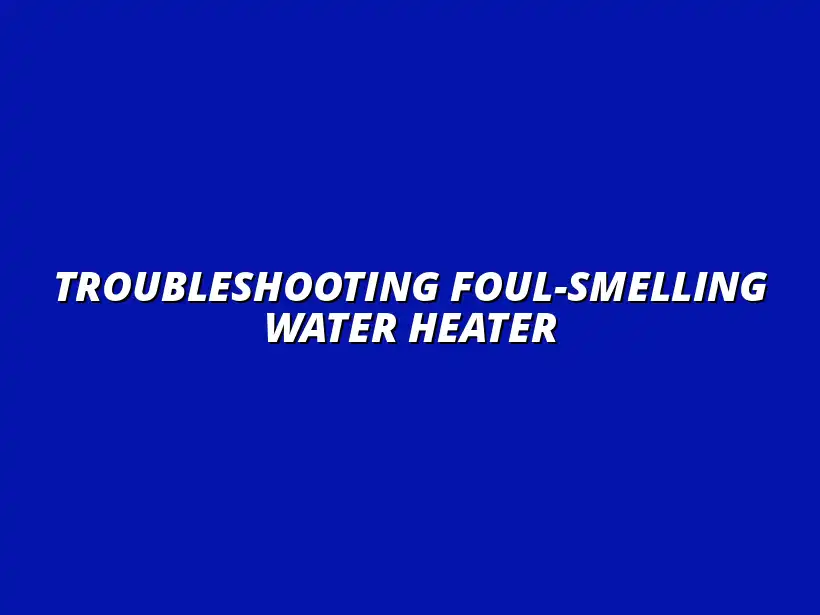
Troubleshooting Foul-Smelling Water Heater
Understanding the Issue of Foul-Smelling Water from Water Heaters
Foul-smelling water from your water heater can cause discomfort and raise concerns about water quality. It’s essential to understand the signs and causes to address the problem effectively. In this section, we’ll explore how to identify foul odors, the science behind them, and common causes.
Identifying the Signs of Foul-Smelling Water
Noticing a strange smell when you turn on the hot water can be alarming. Common signs indicating a problem include a rotten egg scent, metallic odors, or a musty smell. Each of these odors can suggest different underlying issues with your water heater.
Common Odors and What They Indicate
Understanding the specific odors can help you pinpoint the issue. For example:
- Rotten Egg Smell: Often indicates hydrogen sulfide gas, produced by bacteria.
- Metallic Odor: May signal rust or corrosion in the water heater.
- Musty Smell: Can suggest mold or sediment buildup within the tank.
If you notice any of these odors, it's crucial to act quickly to prevent further complications. Ignoring these signs can lead to more significant issues in the long run!
When to Seek Professional Help
Sometimes, the best course of action is to call in the experts. If the odor persists after basic troubleshooting or if you notice other issues like discolored water, it’s time to seek professional help. A qualified technician can diagnose the problem accurately and suggest effective solutions. For example, if you're experiencing a persistent leak, you may want to consult a guide on water heater leak causes and fixes.
Don’t hesitate to reach out for assistance, especially if you're unsure about the root cause of the foul smell. Ignoring persistent odors can lead to health risks and further complications with your water system!
The Science Behind Water Heater Odors
To effectively tackle the problem of foul-smelling water, it’s important to understand the science behind it. Bacteria and sediment buildup are two primary culprits that affect water quality. Let’s dive deeper into how these factors contribute to unpleasant odors.
How Bacteria Affects Water Quality
Bacteria can thrive in warm water environments, such as those found in water heaters. When these bacteria multiply, they can produce gases like hydrogen sulfide, which is responsible for that rotten egg smell. Regular maintenance can help reduce bacterial growth, keeping your water fresh. For efficient maintenance, check out tips on how to maintain your water heater efficiently.
It’s a good idea to perform routine checks on your water heater. If you suspect bacteria are the issue, consider disinfecting the system to ensure clean, odor-free water.
The Role of Sediment Buildup
Another significant factor that contributes to foul odors is sediment buildup in the water heater. Over time, minerals and debris can accumulate at the bottom of the tank, creating an environment where bacteria can flourish. This buildup not only affects water quality but can also decrease the efficiency of your water heater. Learning how to flush your water heater easily can greatly help prevent this.
- Signs of Sediment Buildup: Reduced hot water supply, strange noises from the heater, or visible sediment when draining.
- Prevention Tips: Regularly flush your water heater and check for sediment accumulation.
By addressing sediment buildup, you can improve water quality and reduce unpleasant odors. It’s an effective way to keep your water heater working optimally!
Common Causes of Foul-Smelling Water from Water Heaters
Now that we’ve identified the signs and underlying science, let’s explore the common causes of foul-smelling water. Understanding these causes can help you take proactive measures to maintain fresh water from your heater.
Understanding Sulfur Odors in Hot Water
Sulfur odors in hot water are one of the most frequently reported issues. These odors often stem from the production of hydrogen sulfide gas, which is primarily caused by specific bacterial activity in the water heater. Let's look at the root causes of this problem.
Causes of Hydrogen Sulfide Production
Hydrogen sulfide can be produced by various factors, including:
- Water Source: Well water is often more prone to sulfur odors due to natural bacteria present in the water.
- Temperature: Water heaters set at high temperatures can encourage the growth of odor-causing bacteria.
- Poor Maintenance: Neglecting regular maintenance can lead to bacterial growth and foul odors.
By understanding these causes, you can work to prevent the problem before it starts. Simple preventive measures can make a significant difference in water quality!
Impact of Anode Rods on Odor Development
The anode rod in your water heater plays a crucial role in preventing rust and corrosion. However, certain types of anode rods, particularly magnesium, can contribute to the production of sulfur odors. If you notice a foul smell, it might be time to inspect or replace the anode rod. Addressing sediment buildup in water heaters is also crucial.
Consider switching to a different material, such as aluminum, which may reduce odor production. Regular checks can help you maintain a fresh water supply!
Effects of Hard Water and Mineral Deposits
Hard water is another common issue that can lead to foul-smelling water. This type of water contains high levels of minerals, which can accumulate in your water heater over time. Let's explore how hard water contributes to odors.
How Hard Water Contributes to Odors
Hard water can lead to various issues, including:
- Increased sediment buildup, providing a breeding ground for bacteria.
- Unpleasant tastes and smells in hot water due to mineral deposits.
- Decreased efficiency of the water heater, leading to higher energy costs.
By addressing hard water issues, you can significantly improve the quality of your hot water and reduce odors. You might want to consider water treatment solutions for long-term benefits!
Identifying Signs of Mineral Buildup
Keeping an eye out for signs of mineral buildup can help you catch issues early. Look for:
- Strange noises coming from the heater.
- Reduced hot water flow or pressure.
- Visible sediment when draining the tank.
Addressing these signs quickly can help you maintain a clean and efficient water heater!
Corrosion and Its Impact on Water Quality
Corrosion in water heaters can be a significant contributor to foul odors. As components inside your heater start to corrode, they can release unpleasant smells and affect water quality. Let’s examine how corrosion influences odor development.
How Corroded Components Influence Odor
Corroded parts can lead to a myriad of problems, including:
- Release of metallic odors due to rust.
- Increased likelihood of bacteria growth due to compromised materials.
- Reduced efficiency and lifespan of the water heater.
To combat corrosion, regular maintenance checks are essential. Regular bathroom water heater checks are equally important, as outlined in this guide on regular bathroom water heater checks. This can help ensure the longevity and effectiveness of your water heater!
Recognizing Corrosion Symptoms in Water Heaters
Identifying symptoms of corrosion can help you take early action. Look for:
- Rusty water or stains in your plumbing fixtures.
- Visible rust on the exterior of the heater.
- Frequent need for repairs or replacement parts.
If you notice any of these signs, it might be time to consult a professional. Quick action can help you avoid more severe issues down the line!
Final Thoughts on Maintaining Clean Water from Your Heater
Maintaining clean water from your heater is not just about fixing issues when they arise; it’s about being proactive! Regular maintenance and monitoring can save you from unpleasant surprises down the line. By understanding the signs of potential problems and addressing them early, you can ensure your water remains fresh and clean.
Moreover, with a few simple steps, we can all contribute to better water quality at home. Not only does this enhance our daily lives, but it also extends the lifespan of our water heaters. By prioritizing preventive care, you’ll not only enjoy better water but also enjoy lower energy bills and fewer repairs!
Importance of Regular Maintenance and Monitoring
Regular maintenance is key for any household appliance, especially for water heaters. Taking the time to check your heater can prevent future breakdowns and keep water quality high. Here are some reasons why routine maintenance is essential:
- Prolongs the lifespan of your water heater.
- Reduces energy costs by improving efficiency.
- Prevents costly repairs by catching issues early.
- Ensures safe water quality for your family.
It's also crucial to build awareness around water quality issues. Understanding how different factors can affect your water heater helps in making informed decisions. By being aware of the signs, such as foul odors or unusual noises, you can act quickly to address any problems. If you need help with a clogged drain, consider checking out tips on how to unclog your bathroom drain easily.
How Preventive Care Extends Water Heater Lifespan
Preventive care isn’t just maintenance; it’s a commitment to keeping your water heater in top shape! Simple tasks like regular flushing and checking the anode rod can go a long way. Here’s how preventive care can help you:
- Reduces sediment buildup, which can cause damage.
- Enhances performance, leading to consistent hot water supply.
- Minimizes the risk of unexpected replacements.
Building Awareness of Water Quality Issues
Being informed about water quality is vital for every homeowner. Issues like foul-smelling water can indicate serious underlying problems. It’s essential to stay educated about your water and the factors affecting it, such as:
- Bacterial growth in your water heater.
- Corrosion of internal components.
- Sediment accumulation from hard water.
By knowing these factors, you can better monitor your water heater and take necessary actions before problems escalate. For further assistance, consider seeking help from a local plumber, such as a plumber in Billesley, Birmingham.
Encouraging Reader Engagement and Resources
I love hearing from readers! Sharing experiences can help others troubleshoot their water heater issues. If you’ve faced foul-smelling water, what steps did you take to resolve it? Your story might just help a neighbor avoid the same trouble!
Additionally, there are many resources available for homeowners looking to maintain their water heaters. Whether it’s guides on specific maintenance tasks or tips for cleaning, having the right information is crucial.
Inviting Readers to Share Their Experiences
Reader engagement is so important! I encourage you to drop a comment or share your experiences with water heater maintenance. What worked for you? Did you find any tricks that made a difference? Your insight could help someone else in the same situation!
And remember, sharing your experiences not only helps others but also builds a community focused on improving water quality. Let’s learn from each other!
Additional Resources for Troubleshooting and Maintenance
For those looking for more information, plenty of resources are available to help you troubleshoot and maintain your water heater. Here are a few valuable options:
- Online guides on water heater maintenance.
- YouTube tutorials for visual learners.
- Home improvement forums for community advice.
With these resources at your fingertips, you’ll be well-equipped to keep your water heater running smoothly!
Taking Action to Ensure Fresh Water Supply
When it comes to ensuring a fresh water supply, taking action is essential. If you notice any foul odors or other signs of trouble, don’t wait! The sooner you address these issues, the better the outcome for your home and family.
Implementing a few simple steps can make a significant difference. Here are actionable steps to help you combat foul odors from your water heater!
Steps for Immediate Action Against Foul Odors
If you detect foul odors coming from your water heater, acting quickly is key. Here’s a simple checklist to follow:
- Perform a water quality test to identify contaminants.
- Check the anode rod for corrosion.
- Flush the tank to remove sediment buildup.
- Disinfect the water heater with a bleach solution if necessary.
By following these steps, you can often resolve the issue of foul-smelling water yourself. However, if problems persist, it’s time to consider professional assistance.
Creating a Maintenance Checklist for Homeowners
Having a maintenance checklist can be a lifesaver for homeowners! It serves as a reminder for regular upkeep. Here’s a simple checklist you can follow:
- Check the anode rod every 1-2 years.
- Flush the water heater annually.
- Inspect for leaks during each inspection.
- Monitor water quality regularly.
Keeping this checklist handy can help you stay on top of your water heater’s health!
Finding Professional Help When Needed
Sometimes, it’s best to call in the experts. If you’ve tried DIY fixes and the odor persists, don’t hesitate to seek professional help. Here are some tips for finding the right plumber or water heater specialist:
- Ask for recommendations from friends or family.
- Check online reviews and ratings.
- Ensure they are licensed and insured.
Finding the right professional can make all the difference in keeping your water supply fresh and clean!




